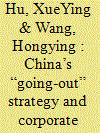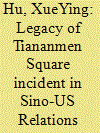| Srl | Item |
| 1 |
ID:
156257


|
|
|
|
|
| Summary/Abstract |
China’s rapidly growing outbound foreign direct investment (OFDI) has attracted a great deal of concern about its impact on the recipient countries. But so far there has been little research on what effect the “going-out” strategy has had on China itself. This is an important question to study because the answer to it will shed light on what kind of an international actor China is becoming as it becomes further integrated with the global economy and what outside influence there can be on China’s domestic governance reform. This article explores the effect of investing overseas on Chinese companies in the area of corporate social responsibility (CSR). Through an analysis of an original sample of data, the authors find preliminary evidence of a positive impact of OFDI on Chinese companies’ commitment to CSR. More research will be needed to uncover the mechanisms and limitations of this apparent trend toward institutional convergence.
|
|
|
|
|
|
|
|
|
|
|
|
|
|
|
|
| 2 |
ID:
147373


|
|
|
|
|
| Summary/Abstract |
The Tiananmen Square Incident of 1989 was one of the most influential events in the last few decades on China’s relationship with the world. In the aftermath, a united front was formed by the international community against China led by the USA. Tiananmen had negatively impacted the views of the American public and Congress on China, and it has not recovered since. At the turn of the century, the international context of US-China relations and China’s domestic, economic, and political conditions had changed drastically since 1989. This study sets out to understand what is the legacy of Tiananmen Square Incident of 1989 in Sino-US relations post-2000. Taking into accounts of the American media, relevant Congressional Committees, Congress legislations, and Department of State from 2000 to 2015, extensive research has been conducted on several aspects of American foreign policy to understand the lasting impacts of Tiananmen. At the start of the year 2000, references to Tiananmen seek to use its strength, as a symbol to associate with contemporary events remained strong in the media and was relatively weak in the discourse of US policy, but the Tiananmen arms embargo debate revived its value in the collective foreign conscience. With China’s increasing prominence on the international stage, American policy toward China is changing particularly with Obama administrations’ introduction of the pivot to East Asia. Invoking negative views of China created by the Tiananmen Square incident could gain greater influence in Sino-US relationship when its symbolic value can enforce traditional power interests.
|
|
|
|
|
|
|
|
|
|
|
|
|
|
|
|